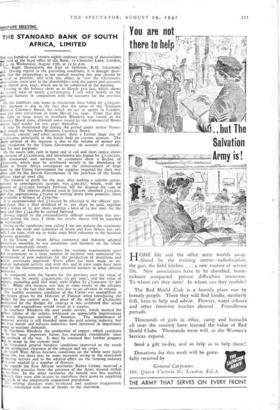COMPANY MEETING
THE STANDARD BANK OF SOUTH AFRICA, LIMITED
Da one hundred and twenty-eighth ordinary meeting of shareholders was held at the head office of the Bank, to Clements Lane, London, E.C.4, on Wednesday, August 27th, at 12.30 p.m. The Right Honourable the Earl of Selbome, K.G. (chairman) said: Having regard to the prevailing conditions, it is thought desir- able that the proceedings at our annual meeting this year should be is brief as possible, and with this object in view the Chairman's observations were sent to the shareholders with the report and accounts as at March 31st, 1941, which are to be submitted to the meeting. Turning to the balance sheet as at March 31st last, which shows the record total of nearly £1o7,000,000, I will refer briefly to the principal features in comparison with the accounts for the previous year. On the liabilities side notes in circulation have fallen by £3543000. This decrease is due to the fact that the notes of the Southern Rhodesia Currency Board, for which we act as agents in London, were put into circulation as from Mai ch 1st, 1940: From that date the right to issue notes in Southern Rhodesia was vested in the Currency Board alone, although notes issued by the Commercial Banks remain legal tender for two years thereafter.
It may be mentioned that during the period under review Nyasa- 'land joined the Southern Rhodesia Currency Board. Deposit, current and other accounts show a further large rise of i17,000,000, principally in the funds held on current account. The ',major portion of the increase is due to the volume of money put Into circulation by the Union Government on account of expendi- ture for war purposes.
On the assets side, cash in hand and at call and short notice shows increase of £13,000,000, and investments are higher by £7,000,000. Bills discounted and advances to customers show a decline of L3,000,000, which may be attributed mainly to the abundance of funds in South Africa consequent on the disbursement of large sums by the Union Government for supplies required for their war IC and by the British Government in the purchase of the South rican 1940-41 wool clip.
The balance of profit for the year, after making a suitable appro- nation to contingencies account, was £561,837, which, with the ount of £157,932 brought forward, left for disposal the sum of 719,769. The interim dividend paid in January absorbed ,025,000, d after appropriating £75,000 to writing down bank premises, there available a balance of £519,769.
It is recommended that £150,000 be allocated to the officers' pen- 'on fund, that a final dividend of 7s. per share be paid, together 'th a bonus of 2s. per share, making a total of 14 per cent, for the ar, and that £144,769 be carried forward.
Having regard to the extraordinarily difficult conditions that pre- ailed during the year, I think the results shown will be regarded satisfactory.
Owing to the conditions now ruling I am not making the customary urvey of the trade and industries of South and East Africa, but you '11, I am sure, wish me to make some brief reference to the business tuation generally.
In the Union of South Africa commerce and industry adapted emselves smoothly to war conditions and business on the whole emained remarkably steady.
The flow of Government orders for wartime requirements gave all employment to a large number of factories and stimulated the evelopment of new industries for the production of munitions and 'des previously imported. Every effort has been made to en- urage industrial activity and with this end in view steps have been ken by the Government to foster potential markets in other African erritories.
As compared with the figures for the previous year the value of ports rose by nearly £14,000,000 (15 per cent.), and the value of ports; excluding gold and wool, were higher by £7,000,000 (27 per nt.). While this increase was due to some extent to the advance prices it is the fact that more was due to an advance in volume. The healthy economic condition of the Union was exemplified in figures given by the Minister of Finance when introducing the udget for the current year. In place of the deficit of £6,500,000 ticipated by the Budget for 1940-41 it was estimated that actual pts and expenditure would result in a surplus. In Southern Rhodesia the year under review, which marked the Iden jubilee of the colony, witnessed an appreciable improvement many important sections of business. The maintenance of notnic activity is still founded upon the gold mining industry, but e base metals and tobacco industries have increased in importance wing to wartime demands. In Northern Rhodesia the production of copper, which continues be the most important factor, has expanded considerably since e outbreak of the war. It may be assumed that further progress be made in the current year. In Nyasaland general business conditions improved as the result the satisfactory clearance of the tobacco and tea crops. In South West Africa business conditions on the whole were fairly vourable, but there may be some recession owing to the restriction mining activity and to the adverse effect on the farming industry a poor rainfall in a number of districts. As regards the East African territories Kenya Colony received a siderable stimulus from the presence of the Army massed within borders. In the other territories the benefit was less marked, though they were able in part to contribute their quota to supplying e needs of the temporarily augmented population. The retiring directors were re-elected and auditors reappointed; eeting concluded with vote of thanks to the chairman.


































 Previous page
Previous page